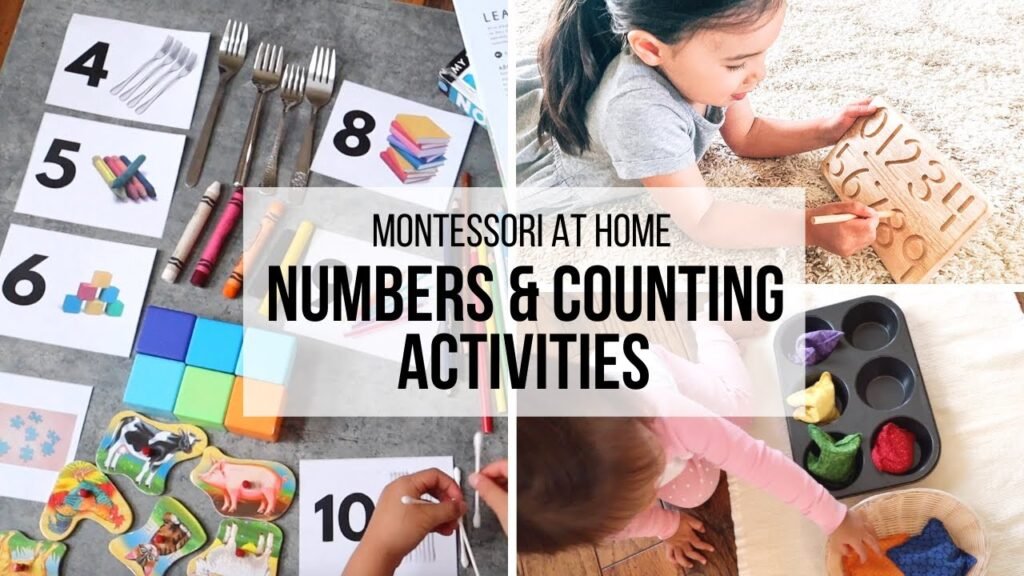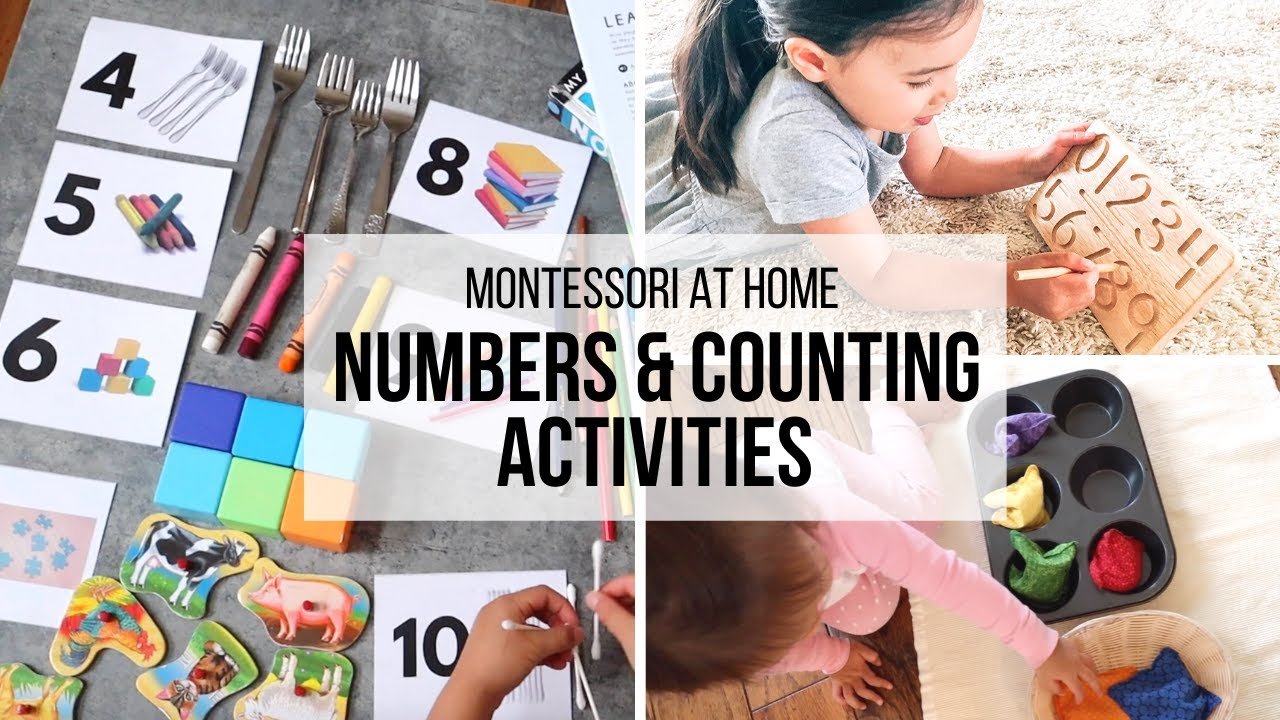You’re in for a treat as we explore Montessori inspired activities for numbers and counting in this article. Join Ashley, a mother of two girls, as she shares the importance of a strong foundation in math for children and the benefits of the Montessori approach to learning math. Discover gentle ways to introduce your child to numbers and counting without rushing them into academic subjects before preschool.
From one busy parent to another, rest assured that your child doesn’t need to be pushed into early academic activities. Experts recommend play as the most important thing for child development between the ages of 0-3. Find out how you can use simple activities like counting objects in a muffin tin or using number puzzles to help your child develop important math concepts in a fun and engaging way.

Introduction
If you’re looking for ways to enhance your child’s math skills in a fun and engaging manner, you’ve come to the right place! Today, I’ll be delving into the world of Montessori at home with a focus on numbers and counting activities for toddlers and preschoolers. In a video presented by Hapa Family, you’ll discover the beauty of incorporating Montessori-inspired methods into your child’s learning journey. Let’s explore the endless possibilities of creating a strong foundation in math for your little ones, step by step.
Overview of Montessori at home video by Hapa Family
In the video by Hapa Family, viewers are treated to valuable insights and practical tips on implementing Montessori-inspired activities for teaching math to young children. From hands-on learning experiences to individualized learning paces, this video sets the stage for a transformative educational approach.
Disclaimer about the video not being sponsored
It’s essential to note that the information and recommendations shared in the video are not sponsored. The opinions expressed are personal and aimed at helping parents and caregivers provide a holistic learning experience for their children. Additionally, affiliate links may be included in the description, but rest assured that there are no additional charges if products or services are purchased through these links.
Affiliate links in description
To support the creators and allow them to continue providing valuable content each week, affiliate links may be present in the video description. By using these links, you can access additional resources or products related to the Montessori approach, further enhancing your child’s learning journey.
Importance of Math Foundation for Children
Establishing a robust foundation in mathematics early on is crucial for children’s overall development. By introducing math concepts in a structured yet playful manner, you pave the way for long-term benefits that extend well into their academic and personal lives.
Setting a strong foundation in math early on
By exposing children to mathematical concepts from a young age, you instill confidence and curiosity in their minds. Building a strong foundation in math early on provides children with the necessary skills and knowledge to tackle more complex mathematical concepts as they grow older.
Long-term benefits of early math education
The benefits of early math education extend far beyond the classroom. Children who receive a solid math foundation at a young age are better equipped to problem-solve, reason logically, and think critically. These skills are invaluable in various aspects of life, from academic pursuits to everyday decision-making.
Benefits of Montessori Approach to Learning Math
The Montessori approach to learning math offers a unique and effective way to engage children in mathematical concepts. By focusing on hands-on learning experiences and catering to each child’s individual pace of learning, this methodology fosters a deeper understanding and appreciation for math.
Hands-on learning experiences
Montessori-inspired math activities often involve tangible materials that children can manipulate and interact with. By engaging their senses and encouraging exploration, children develop a concrete understanding of abstract mathematical concepts, making learning both enjoyable and effective.
Individualized learning pace for each child
One of the key benefits of the Montessori approach is its emphasis on individualized learning. Children are encouraged to progress at their own pace, allowing them to delve deeper into concepts they find challenging or move ahead when they’re ready. This personalized approach ensures that each child receives the support and guidance they need to succeed in math.
No Rush into Academic Subjects Before Preschool
In today’s fast-paced world, parents may feel pressured to introduce academic subjects like math to their children at an early age. However, experts emphasize the importance of allowing children to explore and play during their formative years, rather than rushing them into academic pursuits.
Encouraging exploration and play in early childhood
Play is a fundamental aspect of a child’s development, particularly during the critical years between 0-3. By engaging in imaginative and unstructured play, children build essential skills such as creativity, problem-solving, and social interaction. Providing ample opportunities for exploration and play sets a solid foundation for future academic success.
Avoiding pressure on young children to excel academically
While it’s natural for parents to want the best for their children, it’s essential to avoid pressuring young children to excel academically before they’re developmentally ready. By allowing children to learn through play and hands-on experiences, we foster a love for learning that extends beyond the confines of traditional academic subjects.
Experts’ Recommendations on Child Development
Experts in child development underscore the significance of play as the cornerstone of learning for children aged 0-3. By striking a balance between play and gentle academic exposure, caregivers can create a nurturing environment that supports children’s holistic development.
Play as the most important activity for children ages 0-3
Play is not merely a pastime but a vital component of early childhood development. Through play, children explore the world around them, experiment with new ideas, and develop crucial motor and cognitive skills. Experts advocate for prioritizing play as the primary mode of learning during the foundational years of a child’s life.
Balancing play with gentle academic exposure
While play should take precedence in early childhood, introducing gentle academic activities can complement a child’s learning journey. By integrating math concepts into play-based scenarios and allowing children to engage with numbers and counting in a natural and enjoyable manner, caregivers can facilitate a seamless transition into more structured academic settings.
Gentle Introduction to Academic Activities
While there’s no rush to immerse children in academic subjects before preschool, gently introducing math concepts can be beneficial if done with sensitivity and respect for each child’s pace of learning. By fostering a supportive and engaging learning environment, caregivers can nurture a child’s natural curiosity and enthusiasm for math.
Introducing numbers and counting in a fun and engaging way
When introducing math concepts to young children, it’s essential to make learning enjoyable and interactive. By incorporating games, hands-on activities, and creative exercises, caregivers can ignite a child’s interest in numbers and counting, laying the foundation for future math proficiency.
Respecting children’s individual learning styles
Every child is unique, with varying learning styles and preferences. By respecting each child’s individual pace of learning and tailoring math activities to suit their needs, caregivers can create a nurturing and inclusive learning environment. Whether a child thrives on hands-on experiences, visual aids, or auditory cues, adapting activities to match their learning style ensures successful engagement with math concepts.
Montessori Inspired Activities for Numbers and Counting
Drawing inspiration from the Montessori approach to teaching math, caregivers can create enriching experiences for children that promote a deep understanding of numbers and counting. By incorporating hands-on materials, open-ended activities, and interactive games, caregivers can cultivate a love for math that transcends traditional teaching methods.
Introduction to Montessori teaching methods for math
The Montessori method emphasizes experiential learning through the use of specialized materials and self-directed activities. By introducing children to Montessori-inspired math tools such as number boards, counting trays, and manipulatives, caregivers can facilitate a multi-sensory approach to learning that resonates with young learners.
Hands-on activities for learning numbers and counting
Hands-on activities play a pivotal role in the Montessori approach to teaching math. Children engage with tangible materials such as beads, blocks, and counters to explore mathematical concepts in a concrete and tactile manner. By involving children in activities that require them to physically manipulate objects, caregivers foster a deep understanding of numbers and counting that goes beyond rote memorization.
Counting Activities for Toddlers
Toddlers are at a developmental stage where they are curious and eager to explore the world around them. By incorporating simple counting activities into their daily routine, caregivers can encourage toddlers to engage with numbers in a playful and stimulating manner.
Using everyday objects for counting practice
Everyday objects such as toys, household items, or natural materials can serve as valuable resources for counting practice. Encouraging toddlers to count familiar objects in their environment helps them develop number recognition and one-to-one correspondence skills. Whether counting blocks, fruits, or stuffed animals, toddlers can hone their counting abilities through hands-on exploration.
Singing counting songs together
Counting songs are a delightful way to introduce numbers and counting to toddlers. By incorporating catchy tunes, rhythmic repetition, and engaging lyrics, caregivers can make counting a fun and interactive experience for toddlers. Singing counting songs together enhances language development, numerical skills, and overall cognitive growth in young children.
Number Recognition Games for Preschoolers
As children transition into preschool age, their cognitive abilities expand, enabling them to engage with more complex math concepts. Number recognition games provide preschoolers with opportunities to practice identifying numbers, matching quantities, and developing foundational math skills in a playful setting.
Matching numbers with objects or pictures
Number matching games involve associating numerical symbols with corresponding objects or pictures. By presenting preschoolers with cards or puzzles that feature numbers alongside visual representations, caregivers can reinforce number recognition skills and strengthen their understanding of numerical concepts. Matching numbers with objects fosters visual learning and promotes the development of early math skills in preschoolers.
Creating number recognition puzzles
Number recognition puzzles challenge preschoolers to identify, sequence, and arrange numbers in a logical order. By providing children with puzzle pieces or cards that display numbers, caregivers encourage preschoolers to demonstrate their knowledge of numerical sequences and patterns. Engaging in number recognition puzzles promotes critical thinking, problem-solving abilities, and mathematical reasoning in young learners.
Conclusion
In conclusion, incorporating Montessori-inspired activities for teaching numbers and counting at home can have a profound impact on your child’s mathematical development. By setting a strong foundation in math early on, embracing the benefits of the Montessori approach, and fostering a love for numbers through gentle and engaging activities, caregivers can empower children to excel in mathematics and beyond. Remember, there’s no rush to introduce academic subjects before preschool, but by integrating fun and educational activities into your child’s daily routine, you can create a nurturing environment that encourages curiosity, creativity, and a lifelong love for learning. Start exploring the world of numbers and counting with your child today and watch as their mathematical abilities flourish in the most joyful and transformative ways.

